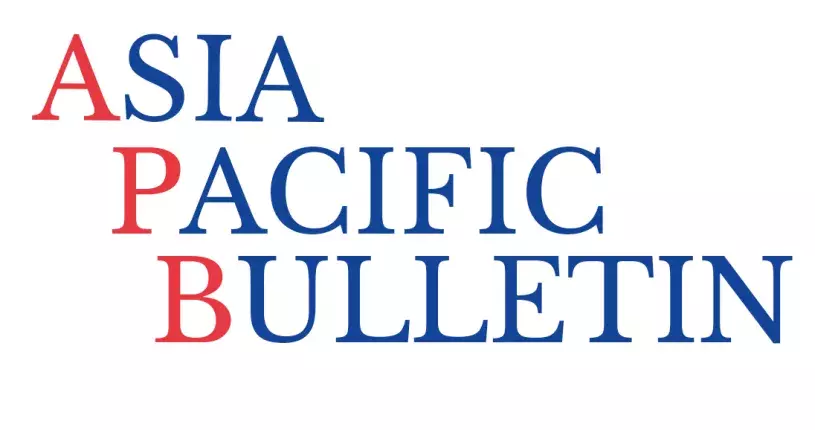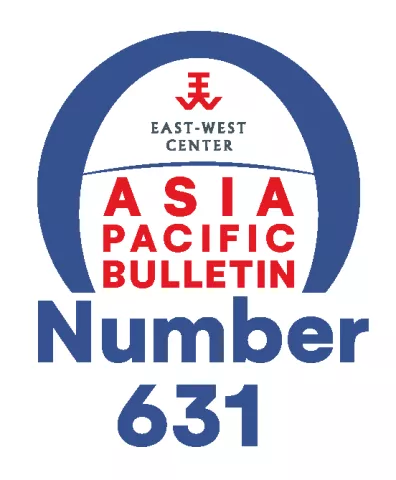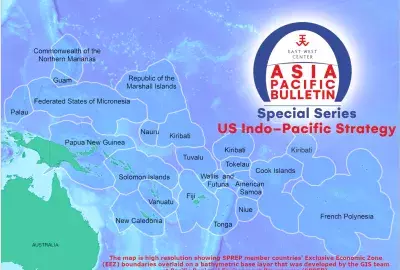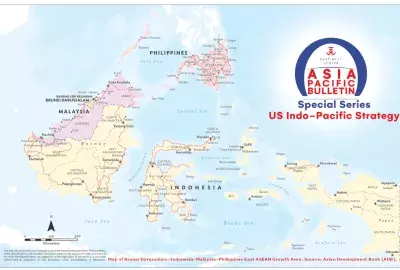Error message


| Anthony V. Rinna, Senior Editor for Sino-NK, explains how "the Kremlin’s post-2022 diplomatic and economic estrangement from much of the world has provided Pyongyang with an opening to leverage ties with Russia to push for an easing of its own diplomatic and economic isolation." |
| for additional titles in the Asia Pacific Bulletin |
| This article is a part of the North Korea in the World Special Series, a joint project between the National Committee on North Korea and the East-West Center that examines North Korea's external relations. |
Spanning the Eurasian landmass, Russia’s actions in adjacent Ukraine invariably affect the geopolitical state of play on the similarly adjacent Korean Peninsula. Although ties between the Democratic People's Republic of Korea (DPRK) and Russia have been of largely secondary importance for both countries since their veritable rupture in the early- and mid-1990s, Moscow-Pyongyang relations became more mutually beneficial in 2022. Whereas most countries have outright condemned Russia’s invasion of Ukraine or taken up an ambiguous position, the DPRK has been vocal in its support for Russia. From the DPRK perspective, the Kremlin’s post-2022 diplomatic and economic estrangement from much of the world has provided Pyongyang with an opening to leverage ties with Russia to push for an easing of its own diplomatic and economic isolation. Meanwhile, strengthening its DPRK ties allows Russia to undermine US influence on its Asian periphery.
In supporting Russia’s full-scale invasion of Ukraine, North Korea appears to be aiming toward obtaining economic benefits from closer ties with Russia, a country whose economy has managed to stay afloat despite heavy Western sanctions. Russia’s full-scale invasion of Ukraine has provided the impetus for Pyongyang’s outreach to Moscow. However, the roots of the current upswing in Moscow-Pyongyang relations go back to the April 2019 summit between Kim Jong Un and Vladimir Putin. Kim received an invitation to meet with Putin in May 2018 yet waited eleven months to meet with the Russian leader, even as Kim regularly met with the leaders of other major players on the Korean Peninsula. Kim may have decided after the February 2019 Hanoi summit yielded few results that strengthening ties with Russia, which was more reluctant than China to support UN sanctions against Pyongyang in 2017, was a more viable option for sanctions relief. Aside from the fact that Russia has demonstrated a clear unwillingness to impose new sanctions against the DPRK, North Korean citizens are reported to still be working in Russia in contravention of UN Resolution 2397. North Korean workers’ earnings are said to have suffered because of Russia’s reduced access to hard currency. Yet, the ruble’s continued resilience may mean that earning currency in Russia is still worthwhile for laborers dispatched at Pyongyang’s behest.
Furthermore, South Korea’s decision to actively participate in Western initiatives in support of Ukraine—including sanctions against Moscow and potentially through arms sales to third countries such as Poland—complicates Russia’s strategy of diplomatic “equidistance” between Pyongyang and Seoul. Moscow has practiced this strategy since the mid-1990s to maintain leverage on the Korean Peninsula, where China and the US enjoy significant influence. This may provide North Korea with an opportunity to present itself as the more reliable partner for Moscow. Indeed, analysts in Seoul have, since Russia designated the ROK as an “unfriendly country” in the spring of 2022, expressed concern that Moscow could aid North Korea in ways that jeopardize South Korean security interests by offering material support for North Korea’s missile program as well as its cyber offensive capabilities.
For Moscow, reciprocating Pyongyang’s unfettered support could benefit Russia’s interest in pushing back against US influence on its Asia-Pacific periphery. Moving to strengthen Pyongyang’s hand on the Korean Peninsula will be an effective way to undermine US interests, akin to how China has increasingly come to see North Korea as a strategic asset. Indeed, after years of striving to portray itself as a responsible actor on the Korean Peninsula, the Kremlin has increasingly turned a blind eye to DPRK violations of international law. Even after launching its full-scale invasion of Ukraine, the Russian government insists it is fulfilling sanctions enforcement obligations against the DPRK as part of its duties as a UN member. Since then, however, senior officials in Russia’s executive and tightly controlled legislative branches have issued statements that indicate both support for increasing the numbers of North Korean citizens taking up employment in Russia as well as an understanding attitude toward Pyongyang’s self-proclaimed status as a nuclear state.
Nevertheless, North Korea-Russia cooperation that challenges international norms will likely occur, and the perpetrators will cloak their questionable activities in justifications from the UN charter. Since 1961, official documents governing Moscow-Pyongyang ties have consistently referred to the UN as a framework under which the bilateral relationship operates. For example, North Korea and Russia have referenced UN provisions to justify hiring North Korean workers in occupied parts of eastern Ukraine. However, these justifications contradict widely held understandings of international law. This strategy signals that Russia will be increasingly inclined to wield its UN veto power to maintain the pretense of being a responsible actor while simultaneously providing cover for Pyongyang to engage in continued sanctions evasion and security provocations. Russia appears to have little incentive to curb North Korea’s security provocations. Thus, Moscow may be more overt in its support for Pyongyang than when it was leveraging plausible deniability in response to alleged sanctions violations.
The interests of Moscow and Pyongyang have converged at a time when the two countries present an unprecedented challenge to the global liberal order. As a result of this development, the geopolitics of Eastern Europe and Northeast Asia are no longer as disparate as they were prior to 2022. Thus, the greatest challenge that a strengthened DPRK-Russia relationship poses to US and allied interests in Northeast Asia is the potential for geopolitical tensions between Russia and the West, primarily rooted in Eastern Europe, to extend into the Asia-Pacific. The Kremlin has been making efforts to strengthen Russia’s position as an Asia-Pacific power. Subsequently, the issue of Korean security—which, broader tensions notwithstanding, was a source of Russia-US cooperation—may become an area in which the Kremlin seeks to frustrate US interests by supporting North Korea’s ability to challenge US and allied policies.

| Anthony V. Rinna, Senior Editor for Sino-NK, explains how "the Kremlin’s post-2022 diplomatic and economic estrangement from much of the world has provided Pyongyang with an opening to leverage ties with Russia to push for an easing of its own diplomatic and economic isolation." |
| for additional titles in the Asia Pacific Bulletin |
| This article is a part of the North Korea in the World Special Series, a joint project between the National Committee on North Korea and the East-West Center that examines North Korea's external relations. |
Spanning the Eurasian landmass, Russia’s actions in adjacent Ukraine invariably affect the geopolitical state of play on the similarly adjacent Korean Peninsula. Although ties between the Democratic People's Republic of Korea (DPRK) and Russia have been of largely secondary importance for both countries since their veritable rupture in the early- and mid-1990s, Moscow-Pyongyang relations became more mutually beneficial in 2022. Whereas most countries have outright condemned Russia’s invasion of Ukraine or taken up an ambiguous position, the DPRK has been vocal in its support for Russia. From the DPRK perspective, the Kremlin’s post-2022 diplomatic and economic estrangement from much of the world has provided Pyongyang with an opening to leverage ties with Russia to push for an easing of its own diplomatic and economic isolation. Meanwhile, strengthening its DPRK ties allows Russia to undermine US influence on its Asian periphery.
In supporting Russia’s full-scale invasion of Ukraine, North Korea appears to be aiming toward obtaining economic benefits from closer ties with Russia, a country whose economy has managed to stay afloat despite heavy Western sanctions. Russia’s full-scale invasion of Ukraine has provided the impetus for Pyongyang’s outreach to Moscow. However, the roots of the current upswing in Moscow-Pyongyang relations go back to the April 2019 summit between Kim Jong Un and Vladimir Putin. Kim received an invitation to meet with Putin in May 2018 yet waited eleven months to meet with the Russian leader, even as Kim regularly met with the leaders of other major players on the Korean Peninsula. Kim may have decided after the February 2019 Hanoi summit yielded few results that strengthening ties with Russia, which was more reluctant than China to support UN sanctions against Pyongyang in 2017, was a more viable option for sanctions relief. Aside from the fact that Russia has demonstrated a clear unwillingness to impose new sanctions against the DPRK, North Korean citizens are reported to still be working in Russia in contravention of UN Resolution 2397. North Korean workers’ earnings are said to have suffered because of Russia’s reduced access to hard currency. Yet, the ruble’s continued resilience may mean that earning currency in Russia is still worthwhile for laborers dispatched at Pyongyang’s behest.
Furthermore, South Korea’s decision to actively participate in Western initiatives in support of Ukraine—including sanctions against Moscow and potentially through arms sales to third countries such as Poland—complicates Russia’s strategy of diplomatic “equidistance” between Pyongyang and Seoul. Moscow has practiced this strategy since the mid-1990s to maintain leverage on the Korean Peninsula, where China and the US enjoy significant influence. This may provide North Korea with an opportunity to present itself as the more reliable partner for Moscow. Indeed, analysts in Seoul have, since Russia designated the ROK as an “unfriendly country” in the spring of 2022, expressed concern that Moscow could aid North Korea in ways that jeopardize South Korean security interests by offering material support for North Korea’s missile program as well as its cyber offensive capabilities.
For Moscow, reciprocating Pyongyang’s unfettered support could benefit Russia’s interest in pushing back against US influence on its Asia-Pacific periphery. Moving to strengthen Pyongyang’s hand on the Korean Peninsula will be an effective way to undermine US interests, akin to how China has increasingly come to see North Korea as a strategic asset. Indeed, after years of striving to portray itself as a responsible actor on the Korean Peninsula, the Kremlin has increasingly turned a blind eye to DPRK violations of international law. Even after launching its full-scale invasion of Ukraine, the Russian government insists it is fulfilling sanctions enforcement obligations against the DPRK as part of its duties as a UN member. Since then, however, senior officials in Russia’s executive and tightly controlled legislative branches have issued statements that indicate both support for increasing the numbers of North Korean citizens taking up employment in Russia as well as an understanding attitude toward Pyongyang’s self-proclaimed status as a nuclear state.
Nevertheless, North Korea-Russia cooperation that challenges international norms will likely occur, and the perpetrators will cloak their questionable activities in justifications from the UN charter. Since 1961, official documents governing Moscow-Pyongyang ties have consistently referred to the UN as a framework under which the bilateral relationship operates. For example, North Korea and Russia have referenced UN provisions to justify hiring North Korean workers in occupied parts of eastern Ukraine. However, these justifications contradict widely held understandings of international law. This strategy signals that Russia will be increasingly inclined to wield its UN veto power to maintain the pretense of being a responsible actor while simultaneously providing cover for Pyongyang to engage in continued sanctions evasion and security provocations. Russia appears to have little incentive to curb North Korea’s security provocations. Thus, Moscow may be more overt in its support for Pyongyang than when it was leveraging plausible deniability in response to alleged sanctions violations.
The interests of Moscow and Pyongyang have converged at a time when the two countries present an unprecedented challenge to the global liberal order. As a result of this development, the geopolitics of Eastern Europe and Northeast Asia are no longer as disparate as they were prior to 2022. Thus, the greatest challenge that a strengthened DPRK-Russia relationship poses to US and allied interests in Northeast Asia is the potential for geopolitical tensions between Russia and the West, primarily rooted in Eastern Europe, to extend into the Asia-Pacific. The Kremlin has been making efforts to strengthen Russia’s position as an Asia-Pacific power. Subsequently, the issue of Korean security—which, broader tensions notwithstanding, was a source of Russia-US cooperation—may become an area in which the Kremlin seeks to frustrate US interests by supporting North Korea’s ability to challenge US and allied policies.







